- Home
- Allison Brennan
Cutting Edge: A Novel of Suspense Page 2
Cutting Edge: A Novel of Suspense Read online
Page 2
They picked this time because shift change had been at midnight; it would be quiet, everyone would have settled into their routines, and the earlier shift would have left.
She saw Cameron’s gun for the first time when they went through the weak link in the electric fence: a rarely used entrance. Why the powerplant didn’t have a guard at the gate, and hadn’t disabled the electronic code, she didn’t know. Maybe this was what Andy meant earlier, that the FBI was letting them get through the gate first so they’d be caught red-handed with pipe bombs. No question what their plans were. But they’d already crossed over land that was closed to the public. What more did the FBI want?
The code Kenny had provided would disable the warning alarm so an employee could enter without the alarms going off. The main office would still be alerted, but because it was close enough to shift time, Kenny said no one would be suspicious.
They just needed to cross another two hundred feet of open space, and then they’d have cover up against an office building. The plan was to walk around the building, emerging only forty feet from the entrance to the reactors. The codes from Kenny would also work to get inside the building.
She hung back with her mother for a moment and whispered, “Lorraine.” Her mother didn’t like being called Mom. Nora couldn’t remember calling her Mom, even as a child.
Lorraine turned to her, irritated. “Can it wait, Nora?”
“Cameron has a gun.”
“It’s okay.”
Lorraine hated guns. How many times had Nora been dragged to a gun-control rally? Holding up signs and proclaiming at the top of her lungs that guns killed? But now her mother sounded like it was totally normal to have a gun. When had that changed? Cameron. He had charisma and charm to woo people into believing his bizarre philosophy, but he was also violent and unpredictable. He had turned her mother from a sixties hippie who would never hurt an animal, person, or plant into a terrorist.
But Lorraine had always been on the crazy side. She’d fallen in with bad groups before, but had gotten out before they went down or dropped out. Not this time. Not with Cameron leading the charge. Yet so much more was at stake. Her freedom and her life.
Then everything happened so fast Nora thought she was dreaming. But it was so vivid she knew she’d never forget.
“Change of plans,” Cameron announced.
“What?” Nora exclaimed.
“Shut up or I’ll kill you.” He meant it. “We run low along the fence until we reach the cooling pools, then turn and move along the base of the north cliffs. It’ll get us closer to our destination without increased risk.”
Change of plans? What if the FBI didn’t have people everywhere? What if they only covered the area where Nora had told Andy they would be? What if Andy was wrong and Cameron could get into the reactor and set off something that would kill not only them, but thousands of people?
Terrified, she followed. She had no choice.
It took nearly ten minutes to reach the base of the cliffs. There were lights everywhere, but Cameron was right. Running along this section of the fence, they remained just out of sight.
They paused only briefly before crossing a small open space to a warehouse. Nora saw a pair of maintenance workers, but they were heading in the opposite direction and didn’t look their way. Nora glanced at Cameron; his hand was on his gun. She knew he’d kill. Her, Lorraine, strangers. His brutal determination was in his stance, in his eyes. Why didn’t Lorraine see it? What was wrong with her mother?
“On three,” Cameron said.
As soon as they moved from their hiding place, blinding floodlights snapped on and she couldn’t see.
“FBI! Down!”
Nora dropped, just like Andy had instructed her.
Cameron dove behind a stack of wooden crates only feet from her. Lorraine and Ken ran behind a large maintenance truck. Nora felt like she was in the middle of a war.
“Lovitz! Surrender. You can’t get out,” a voice boomed over loudspeakers. Nora couldn’t tell where the sound was coming from.
She heard Cameron swearing, then he called out, “Are you ready?”
“Yes,” Lorraine said.
“Do it!”
Do it? Do what?
Lorraine moved from behind the truck and threw something over Nora’s head. It rolled away from her.
It looked like a bomb. Just like the bombs Nora had helped her make. Oh, God, it was over. They were all going to die.
I’m going to die tonight.
“Cover!” Lorraine shouted at her.
Nora scrambled behind the crates closest to her. Seconds later, the bomb exploded.
“Run!” Cameron told her.
Nora didn’t move. She had to stay here. She wasn’t one of them, she didn’t know if whoever was out there knew that she was helping, that she wasn’t a terrorist. She didn’t want to die. If she just stayed here, she’d be okay. Don’t move. Don’t breathe. Where was Andy? Did he know where she was? Would he come for her?
Cameron grabbed her arm and dragged her with him.
“It was you,” he whispered in her ear. “You fucking bitch traitor, you talked.”
“N-no,” she cried.
“We’ll see who’s lying.”
He held the gun to her neck and walked her out into the open. She squinted against the intense brightness of the industrial lights. How could Cameron see? From the corner of her eye, she saw he’d put on glasses, then remembered how he always wore sunglasses backward, around his neck. Even tonight. As if he’d anticipated what would happen.
“We’re leaving!” Cameron called out to the unseen federal agents. “You won’t stop us. We have more grenades; we will use them!”
The hand grenades were homemade, and Nora had always been terrified of them. Lorraine didn’t seem to think there was anything wrong with having her daughters measuring sulfur, charcoal, and potassium nitrate to create black powder for homemade bombs. The bombs, Lorraine said, were never to hurt anyone. They were to save people from themselves.
Nora realized Cameron had brainwashed her mother. Murder was okay, as far as they were concerned, if it advanced their cause.
Cameron started moving away from the building, across the open yard toward where they had come in.
The FBI would never let them leave.
“Cameron Lovitz!” the voice shouted. “Put down your weapon.”
“I’m leaving!”
Cameron continued walking backward, dragging a stumbling Nora with him.
“You’re dead, Nora,” he growled. “You’re a traitor to the cause.”
The barrel of the gun dug into her neck and she cried out.
Cameron called out, “Lorraine! Now!”
Another mini-bomb flew over their heads, landing at the edge of the lights.
The explosion knocked them both to the ground. As they fell on hard pavement, Nora realized that Cameron hadn’t expected such a powerful blast.
Nora thought she was dead, that Cameron’s gun would discharge right into her neck. Clean through, in and out, and her only thought was whether anyone would find Quin and the Jeep.
Cameron fell on top of her, but his hands instinctively reached out to brace himself.
The gun dropped from his grip.
Another explosion, then shouts from everywhere at once, and she thought she heard her mother scream. Cameron reached for the gun. Nora’s hand shot out, trying to bat it out of the way, hitting his wrist.
“Freeze! Don’t move or I’ll shoot.”
Cameron slammed her head into the concrete and everything spun out of control. Nora’s mouth filled with blood.
“Fuck you, pig!” Cameron screamed, his hand on the gun, and his arm jerked up and fired without hesitation. Once. Twice?
The report was deafening. Nora’s ears rang. So much noise, in her ears, in her head, around her, everywhere. And blood, everywhere blood, she must be dying. The pain was all-encompassing, her head spun, she was suffocating. Someone was on top
of her. Cameron.
She opened her eyes, barely able to draw a breath as a heavy weight pinned her down. She saw only Cameron Lovitz’s dead eyes. Lifeless. He had her trapped.
Four hands pulled her out.
Her head was too heavy to hold up. Her eyelids closed.
“Was she hit? Nora? Can you hear me?”
“Andy.” She thought she spoke, but she wasn’t sure.
“It’s ASAC Rick Stockton. Nora, where were you hit? Nora? Can you hear me?”
Hands all over her. Shouts and orders, but nothing she understood. Someone was crying. A scream. An ambulance in the distance. No, it was close. Flashing lights everywhere, but her eyes were closed.
“She wasn’t hit,” someone said.
“She’s not okay!” Stockton snapped. He shined a light in her eyes. Stockton. Stockton. Andy’s boss. Partner? She didn’t know. She didn’t remember.
Someone touched her chest and she cried out. Her shirt was ripped open. “Ribs. Cracked?”
“Are they in custody? God fucking dammit, what’s going on? Status report!”
Stockton sounded worried. Where was Andy? Why wasn’t he here? He promised. He promised everything would be all right …
“Andy,” she whispered. It was hard to speak.
“I’m getting you to a hospital, Nora. You’re going to be okay.”
“Critical,” someone called from far, far away. Everything began to fade. Voices running away from her.
Maybe they were leaving her here.
Lorraine’s shrill voice was like an icepick in her aching head. “I’ll sue you fucking pigs! All of you!” An anguished cry. “You killed him!”
“Get her the fuck out of here!” Stockton ordered.
“Lovitz is dead,” another voice said. “Wright and Potter are in custody.”
“Quin—” Nora said. She tried to get up.
“Don’t move, Nora.”
“Quin—sh-she’s …” She couldn’t make her throat talk.
“We have Quin,” he said. “Quin’s safe. We followed the Jeep.”
People ran past her. She tried to reach out, to touch someone, but the noises dimmed. Someone grabbed her hand. “I’m not leaving you,” Stockton said. “You’re going to be okay, Nora. I promise.”
Her mind snapped shut and she didn’t wake up for three days. When she did, Agent Stockton told her Andy was dead.
CHAPTER
ONE
The arson had been hot, fast, and lethal.
The cloying, acrid scent of the extinguished arson fire had FBI agent Nora English breathing through her mouth as she walked carefully through the remains of what had been the research wing of Butcher-Payne Biotech. The bright white light from emergency spotlights cast an eerie starkness throughout the burned building. Her boots sloshing through the water left behind by the firefighters. Tens of thousands of gallons had flowed into this building to put out the blaze, and the fire crew was surveying the structure to insure there were no remaining hot spots.
They’d been damn lucky. Last winter had been dry, creating a summer combustible with dry brush and trees. The hill of dead, brown foliage behind Butcher-Payne, and the arid canyon across the two-lane highway, could easily have caught fire, spreading through the crisp timber and underbrush faster than they could respond. Fortunately, there’d been no wind to push the fire, and the first responders had done a magnificent job saturating the rooftops and surrounding grounds. In addition, the solid exterior and internal firewalls of the five-year-old building had contained the fire within the research wing.
“The fire sprinklers didn’t go on as they were supposed to,” the Placer County fire chief, Ansel Nobel, said while he escorted Nora to where the body had been found. “The most recent inspection was three months ago; then, they were functioning properly. I don’t understand.”
“Have you checked the water-pump station? Is this area on city or well water?”
“There’s a water storage tank uphill for—damn, that’s it.”
“Excuse me?”
“The water storage tank is for the hydrants. The sprinklers are on a pump system maintained by the county. We hooked up the hydrants without any problems, so when my crew chief told me the sprinklers hadn’t come on, I assumed they were faulty.”
He gestured at the ceiling with his flashlight. The sprinkler heads had distended, but had no water.
“I’ll ask my partner to check it out.” She called Pete Antonovich using the walkie-talkie feature of her BlackBerry. Technically he was no longer her partner, now that she’d been temporarily promoted to squad leader while their SSA was teaching for four months at Quantico. But old habits; she and Pete had been partners since she transferred to Sacramento FBI headquarters nine years ago.
“Pete, it’s Nora. Chief Nobel said the sprinklers didn’t activate. The pump may have been sabotaged—can you talk to the sheriff’s department and get a team over there to check it out?”
“Will do. What’s it like inside?”
“Wet.”
His voice had a modicum of restrained humor. “I meant damages.”
“Same apparent burn pattern as the previous arson fires. Started in the lab and was contained ninety percent there and adjoining offices. The lobby walls have some damage. Hot enough to melt electronic equipment. Arson investigation will know more.”
“When’s Quin going to get here?”
Nora hesitated a moment. Her sister had a reputation, and she hated to fuel it. But this was Pete, so she simply said, “She had a date.”
“It’s five-thirty in the morning.”
“In San Francisco. She promised she’d leave immediately. She wasn’t on call tonight,” Nora defended.
“I’m not being critical, but we need her. I don’t need to tell you they’re escalating.”
The arson gang they’d been investigating for twenty months had never killed before. The three previous arsons had targeted the same industry—biotechnology—but the first two were set in warehouses, and the third fire in a small genetic research building at Sacramento State University. Nora wasn’t certain yet exactly what Butcher-Payne did, but they had “Biotech” in their name and that, coupled with the “message” that had been spray-painted on the exterior—STOP MURDER, signed with the moniker the previous arsonists used, BLF—was enough to make Nora and Pete feel comfortable adding Butcher-Payne to the list.
The only difference in the arson at Butcher-Payne was the victim. Why kill now? Accident or premeditated? Was Jonah Payne targeted because he was Jonah Payne, or simply because he headed the research lab?
“Something else is going on. This just doesn’t feel right to me.” Nora caught herself twisting her shortish, dark blond hair between her thumb and forefinger. She tucked the loose curls behind her ear and dropped her hand.
“Have you seen the vic?”
“I’m heading that way now.”
“I did a field test on the graffiti. The paint is identical to the other arson fires. Chances that this is a copycat drop dramatically.”
“Dammit, Pete, they haven’t killed anyone before.”
“It was just a matter of time, you know that. I’ll go check the pumps and get back to you.”
Nora pocketed her BlackBerry as Chief Nobel said, “It’s happened before.”
That seemed obvious to Nora, and should to Chief Nobel, who was well aware of the previous three arsons. “Excuse me?”
“Arsonists setting a fire not knowing someone is inside.”
“It still makes them murderers, whether they intended to kill someone or not.”
Nobel stood at the entrance to Jonah Payne’s office. “Brace yourself, it’s not pretty.”
Nora buried her emotions deep. It didn’t matter how many times she saw a dead body, or in what condition, the anger and deep sadness at a life taken too soon could overwhelm her if she didn’t close off her feelings. She couldn’t afford to impair her critical judgment. Cops learned to compartmentalize to do the job o
r they ended up dead or drunk. There was a reason cops had nearly twice the suicide rate as the population at large.
Her ability to fully detach herself had earned her a reputation as levelheaded with those who liked her, and a cold bitch with those who didn’t.
Chief Nobel stepped aside. Bright crime-scene tape crisscrossed the charred opening leading into Dr. Jonah Payne’s office off the main research laboratory. The metal door was open, the paint burned off on one side. Had it been open or closed when the fire crew came in? The office itself wasn’t large, approximately fourteen feet square. Paper fueled the flames in here, soggy remnants of pulp everywhere, higher piles of wet ash and partially burned paper on the credenza behind the large desk. No windows, no natural light—Nora didn’t know how anyone could work in such conditions. She’d put skylights in every room of her small country home because she needed sunlight.
The only thing her mother had ever done for her was give her an appreciation of nature.
Good job keeping your emotions in check, thinking of that woman.
Nora focused on the victim, presumed to be Jonah Payne, who lay flat on his back in front of his desk. His position seemed odd to Nora. She’d investigated only one domestic terrorism case that had resulted in fire deaths: in that case, the fourteen victims had been trapped in a burning building and all had died of smoke inhalation. The bodies had been either in fetal positions or prone.
Payne had second- and third-degree burns over all exposed areas of his body. His hair was gone, and the metal from his glasses had melted into his charred skin. His shirt was completely gone, but he’d been wearing jeans, she noted, and while they were black they appeared intact. Denim could withstand fire longer than many other natural-fiber materials. They’d need to put together all these details to figure out exactly what happened to Payne and whether his death was intentional or accidental.
Fire fatalities were among the most difficult crimes to investigate. Much of the damage to the body came from necessary fire-suppression activities, but when firefighters discovered a victim, they did everything they could to preserve evidence while also putting out the flames. Unless there was a bullet in the body, severe blunt-force trauma, or another obvious external force, determining cause of death was extremely difficult.

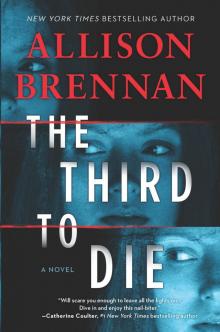 The Third to Die
The Third to Die Nothing to Hide
Nothing to Hide No Way Out
No Way Out Cold as Ice
Cold as Ice Cut and Run
Cut and Run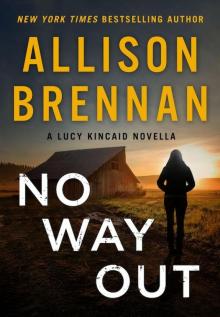 No Way Out (Lucy Kincaid Novels)
No Way Out (Lucy Kincaid Novels) Storm Warning
Storm Warning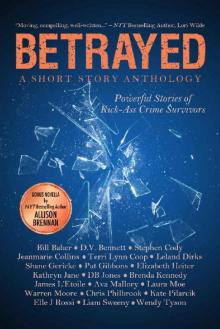 Betrayed: Powerful Stories of Kick-Ass Crime Survivors
Betrayed: Powerful Stories of Kick-Ass Crime Survivors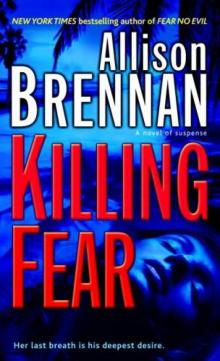 Killing Fear pb-1
Killing Fear pb-1 Make Them Pay
Make Them Pay The Lost Girls
The Lost Girls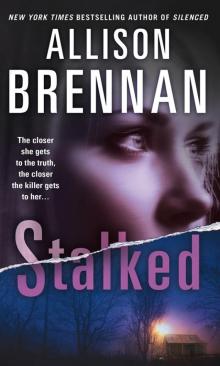 Stalked
Stalked Killing Justice
Killing Justice A Deeper Fear
A Deeper Fear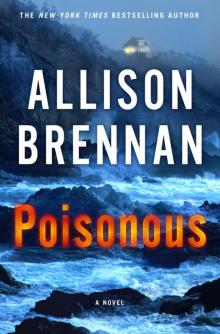 Poisonous
Poisonous Fear No Evil
Fear No Evil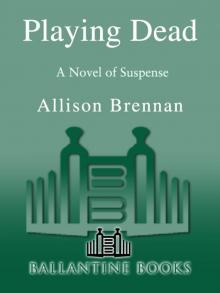 Playing Dead
Playing Dead Cold Snap
Cold Snap Vacation Interrupted
Vacation Interrupted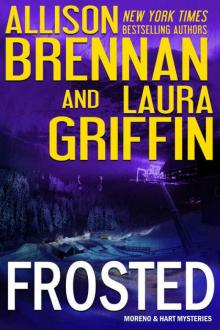 Frosted (Moreno & Hart Mysteries)
Frosted (Moreno & Hart Mysteries) 2 - The Hunt
2 - The Hunt Stolen
Stolen No Good Deed
No Good Deed Cutting Edge
Cutting Edge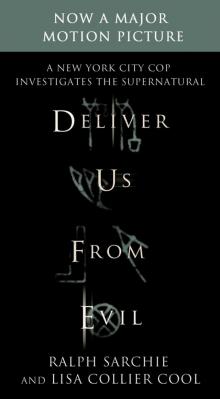 Deliver Us from Evil
Deliver Us from Evil If I Should Die
If I Should Die Speak No Evil
Speak No Evil Silenced lk-4
Silenced lk-4 Original Sin sds-1
Original Sin sds-1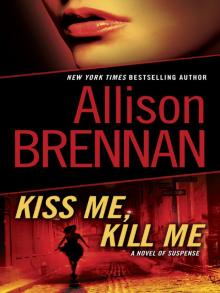 Kiss Me, Kill Me lk-2
Kiss Me, Kill Me lk-2 What You Can’t See
What You Can’t See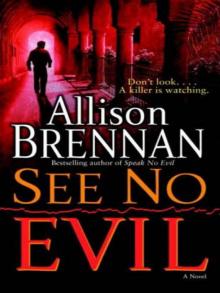 See No Evil
See No Evil The Prey
The Prey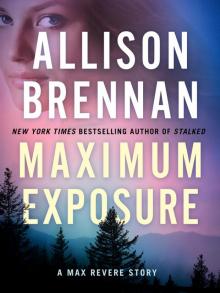 Maximum Exposure
Maximum Exposure Fatal Secrets f-2
Fatal Secrets f-2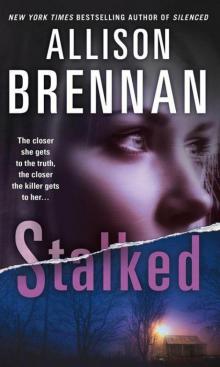 Stalked lk-5
Stalked lk-5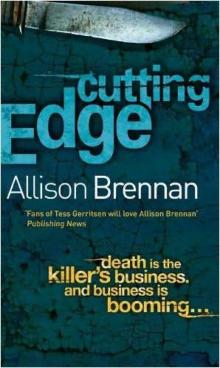 Cutting Edge f-3
Cutting Edge f-3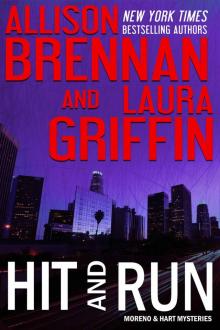 Hit and Run (Moreno & Hart Mysteries)
Hit and Run (Moreno & Hart Mysteries)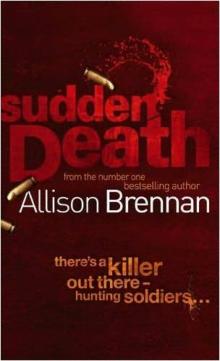 Sudden Death f-1
Sudden Death f-1 If I Should Die lk-3
If I Should Die lk-3 Notorious
Notorious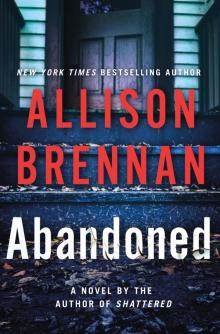 Abandoned
Abandoned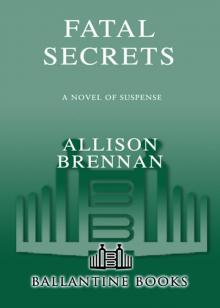 Fatal Secrets
Fatal Secrets The Hunt
The Hunt Carnal Sin sds-2
Carnal Sin sds-2 Love Is Murder
Love Is Murder Lost and Found
Lost and Found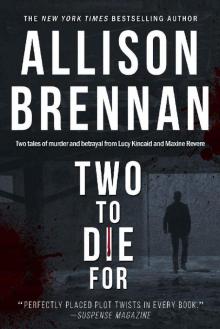 TWO TO DIE FOR
TWO TO DIE FOR Breaking Point
Breaking Point Best Laid Plans
Best Laid Plans Carnal Sin
Carnal Sin Silenced
Silenced Dead Heat
Dead Heat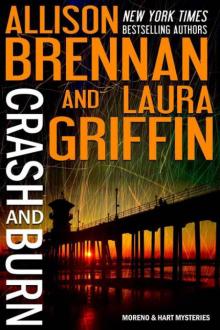 Crash and Burn
Crash and Burn Sudden Death
Sudden Death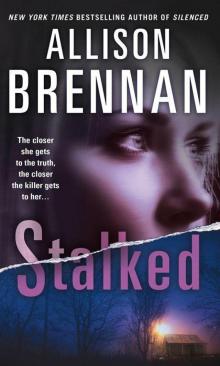 Lucy - 05 - Stalked
Lucy - 05 - Stalked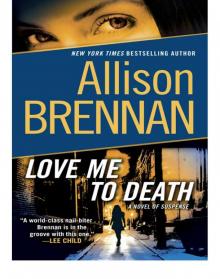 Mortal Sin
Mortal Sin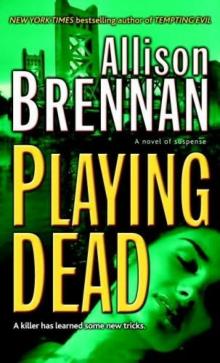 Playing Dead pb-3
Playing Dead pb-3 Kiss Me, Kill Me
Kiss Me, Kill Me Original Sin: The Seven Deadly Sins
Original Sin: The Seven Deadly Sins See No Evil e-2
See No Evil e-2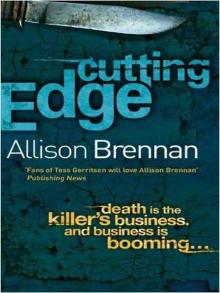 Cutting Edge: A Novel of Suspense
Cutting Edge: A Novel of Suspense Original Sin
Original Sin Too Far Gone
Too Far Gone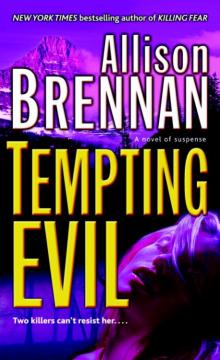 Tempting Evil
Tempting Evil Shattered
Shattered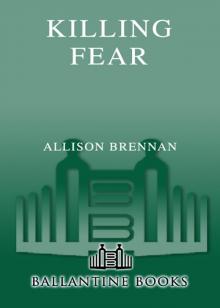 Killing Fear
Killing Fear Murder in the River City
Murder in the River City Love Is Murder (lucy kincaid)
Love Is Murder (lucy kincaid) Stolen (Lucy Kincaid Novels)
Stolen (Lucy Kincaid Novels)